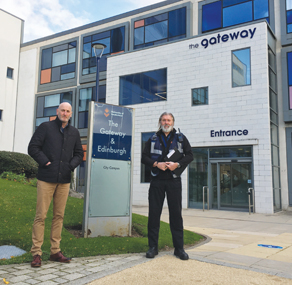In our January 2021 print edition we featured senior criminology lecturer Dr Nicola Roberts, of the University of Sunderland, whose research on student safety has informed Sunderland’s security department.
It’s a common problem, and not only on campuses, that women may feel unwilling to report incidents. The findings are that some women feel particularly worried about being in the dark, and on their own in the dark, on campus. That may affect how and when those students use the campus, such as the library. Once you know that some female students are avoiding parts of campus – particular paths that have hedges or trees, or car parks not well lit – that can inform security practice. As it has at Sunderland. Not all campuses are alike.
Sunderland, like others that Professional Security has featured over the years – Aston in Birmingham, Teesside in Middlesbrough, Manchester Metropolitan – is by the city centre. You could cross the campus as a short-cut from one part of Sunderland to another; in other words, no access control or physical barrier stops you from going on campus. Some campuses, such as Keele and Warwick, are out of town, and non-students would have no cause to be there.
When students are asked, some perceive ‘others’ – such as male strangers or drunks, beggars or homeless people or any young people, even – as dangerous. This is an issue for Security – and not only on campus. At main railway stations and shopping malls, in recent years due to austerity, it has become routine for security officers to have to keep rough sleepers out, and if the homeless or beggars do come in, to move them on. For a shopping mall, it’s a commercial decision; yet a university may feel it has a civic mission, to serve its locality. Yes, a campus security team can move on beggars, in effect treating them as threatening, if that will make students feel safer; but is that what a university is about? Or, are rough sleepers and the like vulnerable, and in need of other treatment? We have here, then, the question of what sort of campus does a university want to be – one barricaded from the outside world, or open, metaphorically and literally. Coronavirus has complicated these questions. Unis have largely shut their doors, for social distancing reasons. Like some other universities, Sunderland allowed the public to use the access-controlled university library, before the lockdown; now they’re not allowed, for covid-safety reasons.
Another reason that it’s so surprising that campus security departments have not drawn on their local criminologists, is that what Nicola points out – such as lighting – is already known to security people, through CPTED (crime prevention through environmental design). Something else highly practical is that students have asked for more targeted security patrols; and Sunderland’s security team have made changes to reflect that. Sunderland has also brought in an ‘after dark’ service. If you are using the library after 7pm until it closes – in December the library was open until 11pm, but come exam time, some uni libraries may be open 24-hours – a student can ring Security if they would like an officer to walk them to a parked car on campus, or to the local Metro station. Take-up has been slow. Is it due to the pandemic? Students aren’t keen on using the phone to ask for Security? Women students would rather have a female security officer walk with them? The service hasn’t been advertised enough? Is it simply a matter of time, for word of mouth to spread (as users have spoken appreciatively of the service)? Again, unless you carry out research, you can only guess why.
Having talked to Nicola, and earlier (in the December 2020 print edition) with security manager Colin Ferguson and duty manager Martin Brewster (pictured), it’s plain that academic research such as Nicola’s can inform the wide-ranging changes so many campus security departments have made in recent years, to better serve students. For example, research suggests that a ‘uniformed presence’ can make people feel safer.
Sunderland has brought in a more distinctive uniform that says ‘SECURITY’ on the back. Nicola herself says that (pre-lockdown) she noticed Security more as a result. If students when surveyed say that they would like to see more patrollers, what security manager would not want to hear that, as ammunition to put in front of his head of estates?! Such feed-back also can serve to keep a department on its mettle; for instance, if students notice that a pair of security officers are together, and say they would prefer to see the pair patrolling singly. That said, the feed-back can only inform the security manager’s decision, for as Nicola wisely points out, there’s not only the safety of the students to consider, but that of the security officers.









